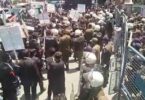F.P. Report
ISLAMABAD: Federal Law Minister Azam Nazeer Tarar has called for holding simultaneous elections in the country, saying according to the Constitution the Election Commission of Pakistan (ECP) has the power to conduct polls.
The law minister once again demanded formation of a full court to resolve the matters pertaining to holding elections in Punjab and Khyber Pakhtunkhwa.
Briefing the foreign journalists on the Supreme Court’s verdict and the government’s stance on it in Islamabad on Thursday, Azam Nazeer Tarar said the solution to the prevailing constitutional, political and legal complications is to hold elections once and same time in the entire country to ensure transparency and fairness.
The law minister said if the elections are held in Punjab and Khyber Pakhtunkhwa in compliance with the court’s orders and again in October after completion of constitutional term of the National Assembly and provincial assemblies of Sindh and Balochistan it will create another constitutional and political crisis.
“The ECP is an empowered and autonomous institution and has complete authority over elections. It is election commission which is vested with the duty of elections and to ensure the polls are conducted fairly,” Azam Tarar said.
He said the controversy began when the assembly was dissolved on advice of the Punjab chief minister. The Punjab governor didn’t sign on the CM’s advice and the assembly itself dissolved after the specified time and it was where the Pandora’s box was opened, he added.
“As per the constitution, there’s a procedure for elections. Elections should be held at the same time all over the country,” he said. The law minister said petitions regarding elections were sub judice in Khyber Pakhtunkhwa and Punjab.
He said the matter was brought to the court and the appeal filed by the governor was pending in the LHC. He warned that the political and constitutional crisis would deepen if full court bench was not formed. The government believed that it would be better if the decision was announced by the full court, he added.
“It is feared that the minority verdict of the Supreme Court would create constitutional crisis. The federal cabinet has expressed reservations on the SC verdict as it believed that the verdict of majority should not be converted into a decision of minority,” he said.
Azam Tarar said while legislation on suo motu notice was pending, two judges had expressed their reservations on suo motu notice. He said on March 1 the court discarded the case with 4/3. Four judges dismissed the petition, while two recused themselves, he added.
The court neither heard any political party nor made one a party in the case.







